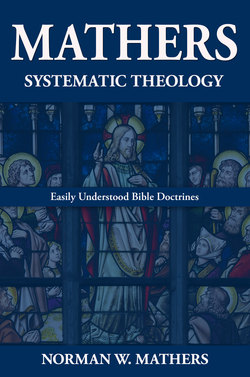Читать книгу Mathers Systematic Theology - Norman W. Mathers - Страница 33
3.5.3 Omniscience
ОглавлениеGod’s all knowingness extends to things which are both actual and realized and possible but not realized. The Godhead knows all things at once past, present, and future without any succession of events whatsoever (Eph. 1:11). Jesus knew that Tyre and Sidon would have repented if His miracles had been done in their midst. Yet in the omniscience of God, he preplanned in eternity past that it would not be ordained. Capernaum received the miracles of Christ but did not respond appropriately to Christ. Jesus, the eternal Son of God, knew their lot in the day of judgment. Sodom’s judgment would be more favorable than Capernaum. Capernaum sinned against great light (truth) being the miracles of Christ (Matt. 11:20-24) God’s omniscience is his being (essence) knowing. Secondly, the eternal God knows all things. This is referred to as the mode by theologians. The all things includes the past, the present, and the future as present to God. His eternal purpose has been planned in eternity past (Hodge 1972:144-145). God is an infinite and perfect being. He knows all things perfectly in and of Himself. God does foreknow all things as certain (1 Sam. 23:11, 12, Acts 2:23, 15:18, Is. 46:9-10)(ibid:146). The smallest details of life are known at all times to God. The Father knows the number of sparrows in the universe at all times (Matt. 10:29). The hairs of one’s head are numbered. The Psalmist develops God’s omniscience of the individual before He is born (139:1-13). The omniscience of God is free from any time limits of succession of events as illustrated by the divine plan of God (Eph. 1:11). The infinite intelligence of the Godhead extends to all of life both to things actual and realized, and possible but not realized. The believer is comforted by the omniscience of God because He knows the answers to all the what if’s of life. The Gospels record that the comprehensiveness of the all knowing infinite mind of the Godhead to the smallest details of life. Jesus knew all men (John 2:24-25). Shedd (1979:1:354) adds two interesting verses to our discussion 1 John 3:20 and Hebrews 4:13. Walvoord (1974:42) draws our attention to the omniscience of God as declared in Psalm 147:4-5. The omniscience of God means that the past, present, and future were before the Godhead in one unified whole (Chafer 1971:1:192). The infinite God comprehends all things at one time (Shedd 1979:1:354). The eternal mind is declared in Ephesians 1:3-14 to have formed the divine decree (plan). The divine mind worked the divine decree after the independent counsel His own will (Aland & Black 1968:665). This included all things before the world and time began (Hodge 1975:1:393-406). The divine mind established the divine means to accomplish all of the events in the divine decree. All things are working according to his eternal decree based on the infinite sovereign mind and will (Eph. 1:10-11). He has foreordained all things that come to pass (Acts 2:23). The divine means for the believer to be saved was he heard the word of truth the gospel. He believed the gospel resulting in his salvation (Eph. 1:13). For the believer saved by grace through faith in Jesus Christ, God supernaturally works (present indicative active 3rd person singular) all things together for good to those who love Him (present active participle – dative masculine plural) (Rom. 8:28). Foreknowledge will be dealt with later under Soteriology (doctrine of salvation). Foreknowledge to know before is divine choice. Romans 8:29 explains Romans 8:28.
